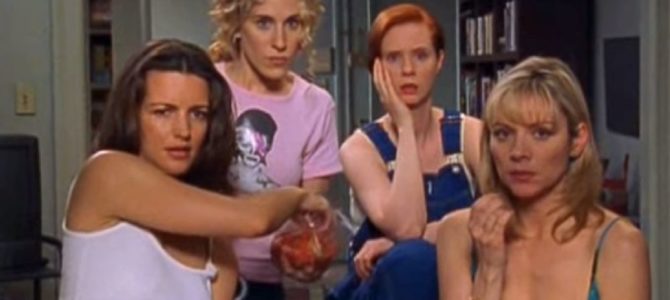
No one would accuse the groundbreaking late-‘90s series “Sex and the City” of advocating for family values. On the nineteenth anniversary of the pilot episode, however, it’s worth looking back on how far leftism and political correctness have advanced since the landmark show was on air. Here are seven plotlines in “Sex and the City” that would never be allowed to fly in today’s social justice warrior-controlled Hollywood environment.
1. Sex and Age Asymmetry
Dating younger men is generally unfulfilling for women (even if they can manage it) but dating younger women works out just fine for men. The pilot episode of the show features “toxic bachelors” giving advice to single women in their 30s. The opening sequence acknowledges the reality that women’s dating options dwindle much more quickly than men’s as they age, calling the phenomenon “the mid-30s power flip.”
In later episodes like “The Valley of 20-Something Guys,” 30-somethings Carrie, Miranda, and Samantha all discover the limitations and humiliations of dating men who are in their twenties. Meanwhile, the ladies all date men up to twenty, or even 30-plus, years older than they are without batting an eye.
2. Telling Hard Truths about Abortion and Conception
Abortion can be emotionally devastating, and conception and pregnancy are more difficult in your 30s. While Carrie and Samantha both cop to abortions in their pasts, discussion of the subject is decidedly more nuanced than it is in modern-day counterpart “Girls,” where a character misses her abortion appointment only because she’s hooking up with a new guy.
Dealing with an unplanned pregnancy, Miranda cries, red-eyed in the waiting room, “Oh God, Carrie, is this my baby?” She ends up choosing life. It’s hard to imagine the Left admitting even this much conflict or emotion over what’s euphemistically termed “choice” today, when they insist that abortion is the moral equivalent of clipping a toenail.
Furthermore, the abortion episode is given added dimension by Charlotte’s parallel struggles to conceive as a “reproductively challenged” wife who desperately wants to take the next step to grow her family. A discussion of the challenges of 30-something conception would likely be on the censor chopping block these days.
3. Relationships Tend to Work Better When the Man Makes More Money
Financially (and unrealistically) successful as each of the “Sex and the City” foursome may be, the series still dealt with the problems that come up in relationships when the traditional male provider role is inverted. Old-fashioned Charlotte states openly, “It’s just normal for the man to have more money,” while Carrie and Miranda struggle with the emotional juggling act of dating men less professionally successful than they are.
On the flip side, all four women consistently date much richer men throughout the series without a second thought.
4. Questioning Sex Partner Counts
Even the suggestion that there might be a number of men to sleep with that counts as “too high” would be problematic nowadays, but “Sex and the City” has an entire episode titled “Are We Sluts?” Even though the show concludes with a critique of the double standard between men and women in numbers of sexual partners, the mere consideration of such a question is unthinkable in the age of the Slut Walk. As is Charlotte’s brunch declaration, “This is bad! Nobody wants to marry a whore!”
5. Allowing Women Space to Prioritize Relationships
It’s okay for women to prioritize relationships and family responsibilities over careers in “Sex and the City,” but verboten today. “Sex and the City” is frequently criticized for portraying women as only concerned about relationships, but the fact is that women do put more emphasis on the interpersonal than men do. The plotlines of the show reflect that, from Charlotte quitting work in advance of hoping to get pregnant and be a stay-at-home mother, to Carrie dropping her iconic column to move to Paris with her lover. Even though that relationship doesn’t ultimately work out, there’s no blanket condemnation issued of Carrie’s priorities.
6. Transsexualism Is Treated as a Joke
Samantha meets a former boyfriend whose drag persona is suspiciously similar to her own, and quarrels with some transsexual prostitute neighbors the girls dub the “Up My A– Players.” Men who imagine they are women are derisively labeled “pseudo-straight married men from New Jersey.”
Bisexualism is treated with skepticism, as “just a layover on the way to gaytown.” While the characters accept homosexuality without a hint of condemnation, they find the “spectrum” of sexuality millennials laud today laughable. Gay, or straight, “pick a side, and stay there.” Anything else is “double-dipping,” according to the SATC ladies.
7. Openness to Different Opinions
The show portrays these topics and more as worthy of serious debate, and assumes women will differ on their opinions about them. Part of the magic and continued appeal of “Sex and the City” is how many different types of women can find themselves represented among the four friends at the heart of the series. As they confront all kinds of situations over the course of six seasons, a variety of worldviews all find a voice, from Charlotte’s traditionalism to Miranda’s feminist careerism to Samantha’s sex-positive outlook.
As the debates rage, Carrie’s uncertainty offers a stand-in to the show’s audience, weighing arguments and experiences from these radically opposed, but all essentially female, perspectives. But left-wing feminists today refuse to acknowledge or legitimize female diversity of opinion. They’ve long left behind voices like Camile Paglia’s or Lana Del Rey’s, preferring to enforce uniformity among women, who in reality hold an enormous variety of political and cultural views. Women who disagree aren’t even deserving of their own vaginas, they say.
Instead of finding their own earnest voices within the debate, modern-day feminists have chosen to silence the Carries, Charlottes, Samanthas, and Mirandas among American women. Close to 20 years after “Sex and the City” first aired, the show has already been relegated to the “wrong side of history.” And that’s “absof–kinlutely” a shame.









